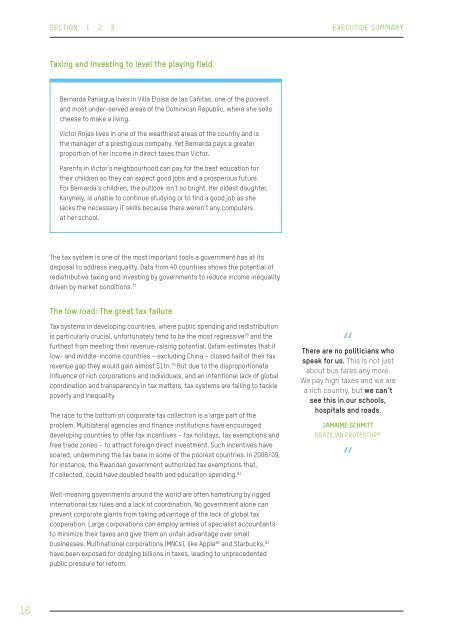1FW2e8F
1FW2e8F
1FW2e8F
You also want an ePaper? Increase the reach of your titles
YUMPU automatically turns print PDFs into web optimized ePapers that Google loves.
SECTION 1 2 3 EXECUTIVE SUMMARY<br />
Taxing and investing to level the playing field<br />
Bernarda Paniagua lives in Villa Eloisa de las Cañitas, one of the poorest<br />
and most under-served areas of the Dominican Republic, where she sells<br />
cheese to make a living.<br />
Victor Rojas lives in one of the wealthiest areas of the country and is<br />
the manager of a prestigious company. Yet Bernarda pays a greater<br />
proportion of her income in direct taxes than Victor.<br />
Parents in Victor’s neighbourhood can pay for the best education for<br />
their children so they can expect good jobs and a prosperous future.<br />
For Bernarda’s children, the outlook isn’t so bright. Her oldest daughter,<br />
Karynely, is unable to continue studying or to find a good job as she<br />
lacks the necessary IT skills because there weren’t any computers<br />
at her school.<br />
The tax system is one of the most important tools a government has at its<br />
disposal to address inequality. Data from 40 countries shows the potential of<br />
redistributive taxing and investing by governments to reduce income inequality<br />
driven by market conditions. 77<br />
The low road: The great tax failure<br />
Tax systems in developing countries, where public spending and redistribution<br />
is particularly crucial, unfortunately tend to be the most regressive 78 and the<br />
furthest from meeting their revenue-raising potential. Oxfam estimates that if<br />
low- and middle-income countries – excluding China – closed half of their tax<br />
revenue gap they would gain almost $1tn. 79 But due to the disproportionate<br />
influence of rich corporations and individuals, and an intentional lack of global<br />
coordination and transparency in tax matters, tax systems are failing to tackle<br />
poverty and inequality.<br />
The race to the bottom on corporate tax collection is a large part of the<br />
problem. Multilateral agencies and finance institutions have encouraged<br />
developing countries to offer tax incentives – tax holidays, tax exemptions and<br />
free trade zones – to attract foreign direct investment. Such incentives have<br />
soared, undermining the tax base in some of the poorest countries. In 2008/09,<br />
for instance, the Rwandan government authorized tax exemptions that,<br />
if collected, could have doubled health and education spending. 81<br />
“<br />
There are no politicians who<br />
speak for us. This is not just<br />
about bus fares any more.<br />
We pay high taxes and we are<br />
a rich country, but we can’t<br />
see this in our schools,<br />
hospitals and roads.<br />
JAMAIME SCHMITT<br />
BRAZILIAN PROTESTOR 80<br />
“<br />
Well-meaning governments around the world are often hamstrung by rigged<br />
international tax rules and a lack of coordination. No government alone can<br />
prevent corporate giants from taking advantage of the lack of global tax<br />
cooperation. Large corporations can employ armies of specialist accountants<br />
to minimize their taxes and give them an unfair advantage over small<br />
businesses. Multinational corporations (MNCs), like Apple 82 and Starbucks, 83<br />
have been exposed for dodging billions in taxes, leading to unprecedented<br />
public pressure for reform.<br />
16


